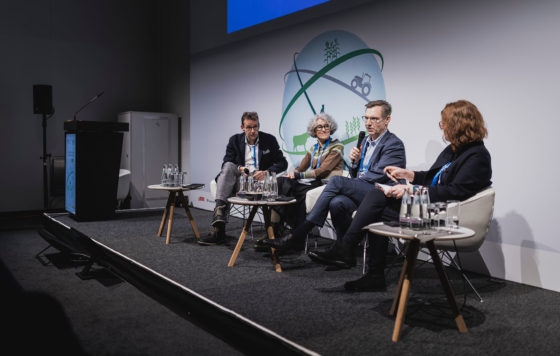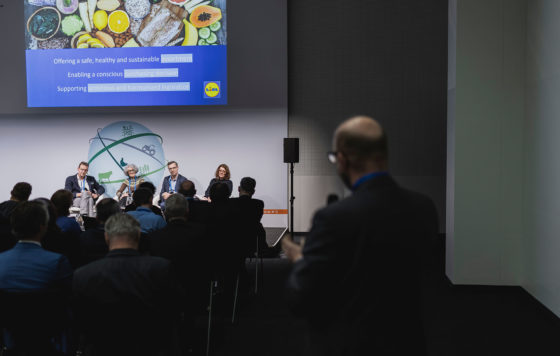Transforming our collective appetite – creating fair food environments
Scientific Advisory Board on Agricultural Policy, Food and Consumer Health Protection (WBAE)
Time: Thursday, 19. January 2023, 4:00 p.m. – 5:30 p.m.
Room: M8
Languages: English, German
Summary:
Ending the reduced VAT rate for animal products, making the Nutri-Score mandatory or improving educational programs about sustainable food consumption – which food policy instrument would you support? Expanding the list by a few more instruments, this panel posed this question to the audience at the start and end of the session. In between, four experts presented and discussed about fair food environments and their role in transforming our collective appetite. A collective appetite that is more aligned with the four sustainability dimensions: health, environment, social aspects and animal welfare as defined by the Scientific Advisory Board on Agricultural Policy, Food and Consumer Health Protection in their expertise on an integrated food policy (WBAE, 2020). Professor Britta Renner opened by illustrating how the food environment influences our nutritional behavior over the entire behavioral process: from what we see (exposure), what is accessible to us (access), what we choose (choice) to what we eat (consumption). Thereby, the food environment is a huge leverage in order to achieve more sustainable food choices. For that, policy makers need to make them “fair”, i.e. attuned to our human perception, decision-making and behavioral capabilities and with more and easier choices for a more sustainable diet. Providing information is out of numerous reasons not enough. Professor Theresa Marteau built on these insights by highlighting which policy interventions show most promise in changing the food environment, namely fiscal interventions (taxes & subsidies), changing the assortments of meals on offer, and reducing the portion and package size of higher energy foods. Despite the existing empirical evidence about how fair food environments can be created, barriers exist, such as opposition by industries and lack of public demand for change. The panel also provided a perspective from the industry: Stefan Haensel introduced Lidl’s strategy towards conscious nutrition. It involves moving towards an assortment that is more aligned with the planetary health diet, a stop of marketing “unhealthy” foods towards children and an increased transparency via labels. The subsequent discussion, moderated by Professor Achim Spiller, touched e.g. on lessons that can be learnt from tobacco policies. And, what about the polls? In both rounds the audience was in favor of compulsory quality standards in public canteens, like schools, and generally of fiscal policies. Interestingly, the support for educational programs about sustainable food consumption reduced substantially in the course of the expert panel.
Keynote Speaker
Prof Dr Britta Renner
University Professor (W3)
Chair of Psychological Assessment and Health Psychology
Faculty of Psychology
University of Konstanz
Universitätsstr. 10
78464 Konstanz
Phone: 07531-88 4679; E-Mail: britta.renner@uni-konstanz.de
Web: http://www.health.uni-konstanz.de, twitter: healthpsykn
Priority Topics
Examination of psychological determinants for health behaviour with a focus on dietary habits as well as the development of mobile interventions for behavioural changes. Another key subject area is subjective risk perception and risk communication.
2004 Habilitation and venia legenda (in Psychology, University of Greifswald)
2000 Doctorate in Psychology at Freie Universität Berlin
1993 Diploma in Psychology at Freie Universität Berlin
Career
W3 Professor since 2007, Faculty of Psychology, University of Konstanz
2011 Chair of Health Psychology (W3), Faculty of Psychology at Freie Universität Berlin (rejected)
2004-2007 Professor of Psychology, JCLL, Jacobs University Bremen
2000-2004 Postdoc at the Institute of Psychology at the University of Greifswald
1993-1999 Research Assistant at the Faculty of Psychology at the Freie Universität Berlin.
Akademische und wissenschaftliche Funktionen
2019-now Vice-President of the German Nutrition Society (DGE)
2019-now Member of the Senate of the University of Konstanz
2019-now Member of the Advisory Boards of the Karl Landsteiner University of Health Sciences, Austria
2018-now Executive Board Member and Project Coordinator (PI) of the DFG Cluster of Excellence 2117 “Centre for Advanced Study of Collective Behavior”, University of Konstanz
2018-now Spokesperson of the Expert Group on Dietary Habits Research of the German Nutrition Society (DGE)
2018-now Deputy Chairperson of the Scientific Advisory Board on Agricultural Policy, Food and Consumer Health Protection (WBAE) at the Federal Ministry of Food and Agriculture
2015-now Member of the Scientific Advisory Board on Agricultural Policy, Food and Consumer Health Protection (WBAE) at the Federal Ministry of Food and Agriculture
2015-2021 Member of the Advisory Board of the Competence Cluster Nutrition Research Berlin- Potsdam NutriAct
2012-2015 coordinator of the group “”risk communication””; BMBF “”Risk management of emerging compounds and pathogens in the water cycle”” (RiskWa)
2008-2017 Executive Board Member of the Lurija Institute for rehabilitation sciences
2007-2011 Spokesperson of the Expert Group on Health Psychology of the German Society for Psychology
2010 Sub-dean of the Faculty of Science, University of Konstanz
2009-2011 Spokesperson of the Faculty of Psychology, University of Konstanz
2006-2010 President and “”Past President”” of the European Health Psychology Society, EHPS.
Acknowledgements and Distinctions
2015 Fellow of the European Health Psychology Society (EHPS)
2015 Science Prize Kulinaristik 2015
2015 & 2021 ‘LUKS’ Prize for Excellent Teaching, University of Konstanz, Germany
2010 Fellow of the Association of Psychological Science (APS)
2001 Marie Schlei Dissertation Award, Freie Universität Berlin, Germany
Support / third-party funding [past five years]
2015-2018 Spokesperson of the DFG research group “”The Dynamics of Risk – Perception and Behavior in the Context of Mental and Physical Health”” (risk dynamics), together with Prof Dr Harald Schupp
since 2016 Spokesperson of the interdisciplinary BMBF collaborative project “”Individual and context-based real-time interventions to promote normal eating habits and physical activities through mobile technology”” (SMARTACT), together with Prof Dr Harald Schupp
2014-2017 EU-JPI research project “”Determinants of Diet and Physical Activity Knowledge Hub”” DEDPIAC, Spokesperson of working package 2.1 with 24 consortium partners from 11 EU countries.
Scientific Publications [selection]
Debbeler LJ, Schupp HT, Renner B (2021). Pessimistic health and optimistic wealth distributions perceptions in Germany and the UK: evidence from an online-survey. BMC Public Health, 21(1).
König LM, Renner B (2019). Boosting healthy food choices by meal colour variety: Results from two experiments and a just-in-time Ecological Momentary Intervention. BMC Public Health, 19, 975.
Renner, B., Arens-Azevêdo, U., Watzl, B., Richter, M., Virmani, K., & Linseisen, J. (2021). DGE-Positionspapier zur nachhaltigeren Ernährung. Ernährungs Umschau, 68(7), 144-154.
Renner B, Hankonen N, Ghisletta P, Absetz P (2012) Dynamic psychological and behavioral changes in the adoption and maintenance of exercise. Health Psychol 31:306-15.
Renner B, Sproesser G, Strohbach S, Schupp HT (2012) Why we eat what we eat: The Eating Motivation Survey (TEMS). Appetite 59:117-28.
Renner B (2004) Biased reasoning: Adaptive responses to health risk feedback. Personal Soc Psychol Bull 30: 384-96.
Schmälzle R, Renner B, & Schupp HT (2017). Health risk perception and risk communication. Policy Insights from the Behavioral and Brain Sciences, 4(2), 163-169.
Spiller A, Renner B, Voget-Kleschin L, Arens-Azevedo U, Balmann A, Biesalski HK, … & Weingarten, P. (2020). Politik für eine nachhaltigere Ernährung: Eine integrierte Ernährungspolitik entwickeln und faire Ernährungsbedingungen gestalten. Berichte über Landwirtschaft-Zeitschrift für Agrarpolitik und Landwirtschaft.
Sproesser G, Schupp HT, Renner B (2014) The bright side of stress induced eating: Eating more when stressed but less when pleased. Psychol Sci 25:58-65.
Stok FM, Hoffmann S, Volkert D, Boeing H, et al. & Renner B (2017) The DONE framework: Creation, evaluation, and updating of an interdisciplinary, dynamic framework 2.0 of determinants of nutrition and eating. PLoS One 12(2):e0171077.
Wahl D, Villinger K, König L, Ziesmer K, Schupp HT, Renner B (2017) Healthy food choices are happy food choices: Evidence from a real life sample using smartphone based assessments. Sci Rep 7:17069.
Villinger K, Wahl DR, Engel K, Renner B (2021). Nudging sugar portions: a real-world experiment. BMC Nutrition, 7(1), 65.
Villinger K, Wahl DR, Boeing H, Schupp HT, Renner B (2019). The effectiveness of app-based mobile interventions on nutrition behaviours and nutrition-related health outcomes: A systematic review and meta-analysis. Obes Rev, 1-20.
Panel Guests
Her research interests include:
- development and evaluation of interventions to change behaviour (principally diet, tobacco and alcohol consumption) to improve population health equitably and sustainably, with a particular focus on targeting non-conscious processes
- risk perception and communication, particular of biomarker-derived risks, and their weak links with behaviour change
- acceptability to publics and policy makers of government intervention to change behaviour
Current research in her group is funded by Wellcome.
She co-chairs The Lancet-Chatham House Commission on improving population health post COVID-19, focusing on identifying key actions for equitable and sustainable improvements in health.
She currently participates in the UK government’s Scientific Advisory Group for Emergencies (SAGE), responding to the COVID-19 pandemic, and in particular, two SAGE subgroups: the Scientific Pandemic Insights Group on Behaviours (SPI-B) and the Environment and Modelling Group (EMG).
Moderation
Achim Spiller is a full member of the Academy of Sciences in Göttingen.
Since December 2020, he has been chairman of the scientific advisory board for “Agricultural Policy, Nutrition and Consumer Health Protection” with the Federal Ministry of Food and Agriculture.
In July 2020, he was appointed to the Future Commission on Agriculture set up by the Federal Cabinet of Germany. Since 2019, he has been a member of the BMEL Competence Network for Livestock Farming (“Borchert Commission”) at the invitation of the Federal Minister.
In the FAZ economist ranking, Achim Spiller was honoured as one of the 100 leading German economists in 2015, 2016, 2018 and 2020.
Achim Spiller is chairman of the scientific advisory board for the “”Animal Welfare Label of the German Animal Welfare Federation“.
From 2014 to 2016, he was a member of the Competence Group Animal Welfare at the personal invitation of the Federal Minister of Food and Agriculture; from 2013 to 2018, he was a member of the board of trustees of the QS system, 4 years of which he served as chairman.
From 2011 to 2015 he was Dean of the Faculty of Agricultural Sciences, from 2015 to 2017 Dean of Finance.
Editorial Boards: (1) Journal of Consumer Protection and Food Safety and (2) Review Editor for Animal Welfare and Policy Frontiers in Animal Science.






